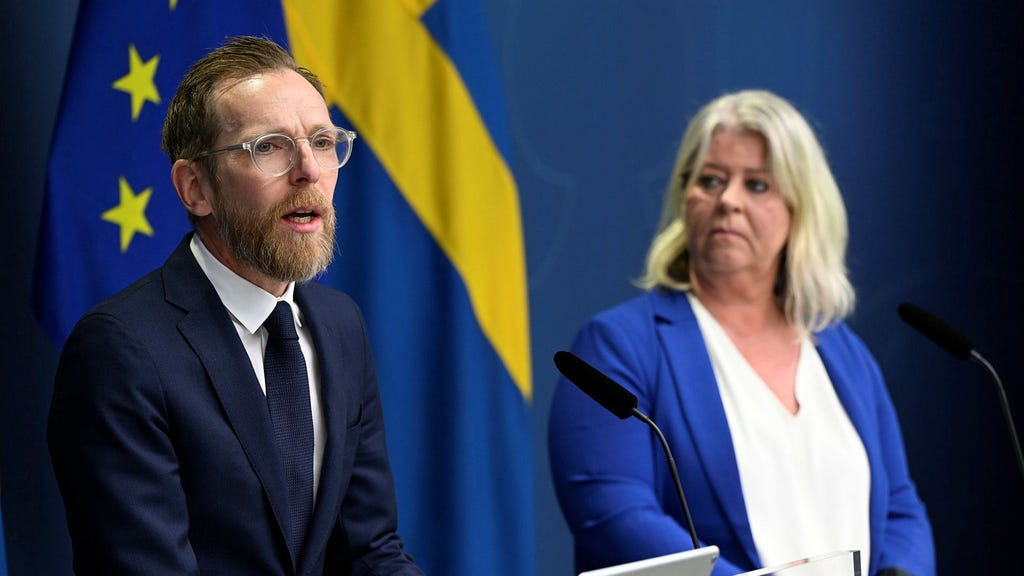The Swedish government has unveiled a comprehensive national strategy to address mental health and suicide prevention, prompted by a series of seemingly random violent attacks perpetrated by individuals believed to be suffering from mental illness. Within a month, four separate incidents occurred across the country, leaving victims seriously injured or dead. The common thread linking these attacks appears to be the lack of any prior relationship between the perpetrators and their victims, leading authorities to classify them as random acts of violence driven by mental instability. Social Services Minister Camilla Waltersson Grönvall expressed horror at the attacks, particularly the fatal stabbing of a 60-year-old woman working at a grocery store, highlighting the need for increased safety and societal protection against such unpredictable violence.
The government’s response, described by Social Affairs Minister Jakob Forssmed as the ”most comprehensive initiative presented to date,” aims to coordinate the efforts of 25 different government agencies in combating mental illness. This unprecedented collaboration underscores the seriousness with which the issue is being addressed, reflecting a recognition that mental health is not solely a healthcare concern but a societal one demanding widespread engagement. The strategy emphasizes the importance of a holistic approach, integrating various sectors of society to tackle the complex challenge of mental illness effectively. Forssmed believes this coordinated effort is unique not only within Sweden but potentially globally, signifying a significant shift in the approach to mental health management.
A key aspect of the new strategy involves breaking down the barriers of confidentiality between different government bodies. Minister Waltersson Grönvall stressed the necessity of improved communication between psychiatric services, social services, and law enforcement agencies. She cited previous tragic cases, including parents killing their children, where enhanced inter-agency cooperation could have potentially averted the tragedies. By facilitating information sharing, authorities hope to identify and intervene with individuals exhibiting warning signs of violent behavior before they can harm themselves or others. This focus on preventative measures reflects a proactive approach to mitigating the risks associated with untreated or inadequately treated mental illness.
The government’s plan also prioritizes suicide prevention, recognizing the significant link between mental health struggles and suicidal ideation. The strategy aims to improve the identification and support of individuals at risk of suicide, enhancing access to mental healthcare services and strengthening community-based support systems. Minister Forssmed highlighted the existing legal framework for compulsory psychiatric care for individuals deemed a danger to themselves or others, emphasizing the need to strengthen this system and ensure its effective implementation. He acknowledged the complex nature of these cases, particularly those involving co-occurring substance abuse, which often complicates both diagnosis and treatment.
The recent attacks have fueled discussions about how to better identify and intervene with individuals experiencing severe mental illness who might pose a threat to others. Minister Forssmed emphasized the importance of strengthening psychiatric care and enhancing the capacity to treat individuals with complex mental health challenges. While acknowledging the difficulty of preventing every such incident, he stressed the need to learn from these tragic events to improve future responses and preventative measures. He pointed out that some individuals may commit acts of violence without any prior contact with mental health services, highlighting the challenge of predicting and preventing such unpredictable acts.
The four recent incidents that spurred the government’s action included the murder of a woman in her 30s near a bus stop, the serious injury of a man outside a restaurant, the attack on a woman walking her dog, and the fatal stabbing of the grocery store employee. In each case, the victims appeared to be randomly targeted, with no apparent connection to the perpetrators. These incidents underscore the urgency of addressing the societal challenges posed by untreated mental illness and the need for comprehensive strategies to support both those struggling with mental health conditions and the safety of the wider community. The government’s new initiative represents a significant step towards a more integrated and proactive approach to mental health care and violence prevention in Sweden.














